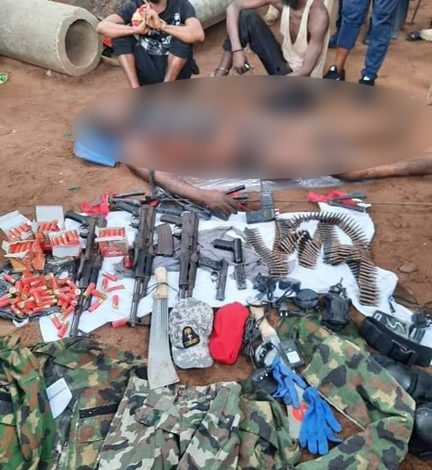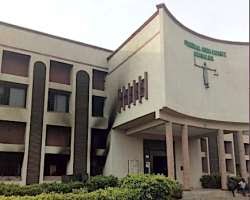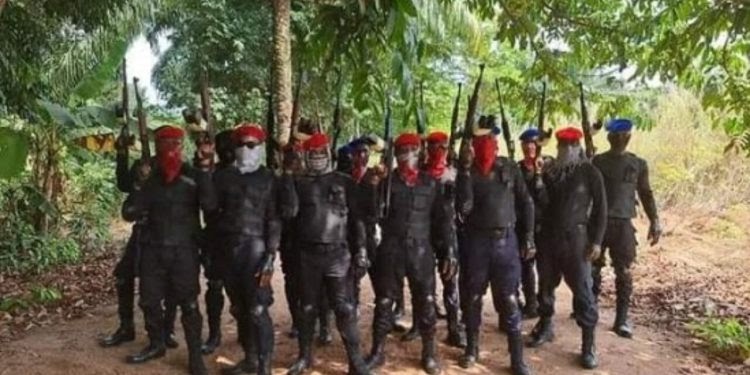Death Of ESN Commander, Ikonso, Is Triggering Waves Of Violence In Southeast
The IPOB leader, Ikonso, was allegedly killed in his sleep. Since his death, pockets of violence have been visited on Southeast Nigeria states.

On Saturday, April 24, the security challenges in Southeast Nigeria took a nosedive when an armed gang set ablaze the home of Hope Uzodimma, Imo State Governor in Omuma, Oru East Local Government of the state.
The assailants also set cars in the premises on fire, killing two guards in the process.
The destructive attack in the governor’s house was said to be a consequence of the killing of Nwokike Anyinayo Andy, popularly known as Ikonso, the deputy commander of Eastern Security Network (ESN), the militant arm of the proscribed Indigenous People of Biafra (IPOB).
Why we took Ikonso, leader of ESN out – Police
Police said Ikonso died alongside six ESN militias during a shootout with a combined force of Police, Department of State Services and the Nigeria Army at the operational headquarters of IPOB in Awomama Village, Oru East Local Government Area, Imo State.
In a statement, the police alleged that the IPOB militias were responsible for the attack on the Imo State Police Headquarters and the headquarters of the Nigerian Correctional Service on Monday, April 5.
After the jailbreak at the Nigerian Correctional Service in Owerri where over 1,800 inmates escaped, the Southeast region has witnessed numerous coordinated violent attacks on security personnel and formations that bore the signature of the ESN armed group.
“As the security forces approached the base of the insurgents, they came under rapid fire from the group. In a bold and clinical response, the joint security forces fought back gallantly,” the police headquarters said.
“The forces eventually neutralised the overall commander of the insurgents in the Southeast popularly known as Ikonso Commander and six other armed fighters of the insurgent group.”
Police say Ikonso was known as the Vice President-designate and the coordinator of all the militia operations of the ESN who was responsible for all the coordinated attacks in the Southeast on police officers and police formations.
“He was the mastermind and coordinator of the attack on the Imo Police Headquarters and several other attacks on security and military personnel and facilities, the operation is part of a deliberate effort by the police and other security forces to quell the activities of insurgents in Imo State and other states of the Southeast and South-south region of the country,” the statement claimed.
“After the fierce gun battle, the security team recovered the remains of Ikonso Commander and the six of his fighters, several sophisticated weapons including six AK47 rifles, hundreds of ammunition of different calibre and lots of charms including bullet Proof charms were recovered from the insurgents.”
No, Ikonso was attacked in his home – IPOB
However, IPOB leaders countered the police account. Nnamdi Kanu, IPOB leader in a live broadcast on Facebook said there was no gun battle between Ikonso and the Nigerian forces but rather he was killed in his sleep.
Kanu described the slain commander as a freedom fighter who was committed to defending his people from marauding ‘Fulani herdsmen’ who according to him, had displaced his people from their farms and were raping and killing women unhindered.
Also, Emma Powerful, the group’s spokesperson said Nigerian forces had murdered sleep with the killing of Ikonso and threatened that Imo State, and the entire Southeast region would not know peace because the group would avenge the death of its fighters.
He blamed the death of the gang leader on Hope Uzodinma, Governor of Imo State and threatened that he would pay for it.
“Uzodima decided to kill Ikonso because he refused his offer to head Ebubeagu ghost security outfit formed by South-East governors. Uzodinma has tried but without success to lure ESN operatives into Ebubeagu.”
Deluge of attacks
After Ikonso’s death, spontaneous attacks occurred in Southeast and parts of Southsouth on security personnel and formations.
In Imo State, the Police Area Command Headquarters was attacked on Monday, April 26. The attackers set the building ablaze while five police officers were killed.
There was heavy gunfire between an armed group and security forces around Douglas Area in the heart of Owerri, the capital town on the night of Saturday, April 24 with an undisclosed number of casualties.
Suleiman Ibrahim, a Senior Special Assistant to the Governor of Imo State on Gender and Vulnerable Groups – Northern Affairs (Men), was reported to have said that anxiety had gripped residents of Ama Hausa, a community of Northerners in the state as a result of the attack by the group on Monday, April 26.
Suleiman during an interview with journalists in Owerri said he could not confirm casualties in the attack.
He said, “suddenly we heard gunshots and everyone took cover as there was palpable fear. It lasted for about thirty minutes before they withdrew.”
The Anambra State Police Command confirmed the death of no fewer than nine persons in Awkuzu, Oyi Local Government Area of the state in a single attack.
Tochukwu Ikenga, Police Public Relations Officer in Anambra, said that some other people were injured during the attack, with property and livestock destroyed.
He could not provide the identities of the victims as the attack was under investigation. The police spokesperson said that the killers were armed with machetes and other dangerous weapons.
Also in Anambra, a shootout between an armed group and navy personnel in Onitsha on Tuesday, April 27, resulted in two deaths.

In Ebonyi State, the Federal High Court was hit with explosives by arsonists suspected to be members of the separatist group.
David Umahi, Ebonyi State Governor, thereafter, imposed an all-night curfew among other measures aimed at checking insurgency in the state.
In Abia State, an armed group on the evening of Tuesday, April 27, attacked Nkporo Police Station in Ohafia Local Government area of Abia State, razing the main building of the station.
The arsonists also released some suspects in detention during the attack, and burnt exhibits, including motorcycles and cars at the station, leaving many residents of the area frightened.
The unrestrained attack also resonated in Rivers State, South-south Nigeria where no fewer than 14 soldiers, customs officers, and police officers were killed in two separate coordinated attacks.
In Akwa Ibom State, an armed gang on the same Tuesday evening killed two police officers at a checkpoint at Urua Inyang in Ika Local Government Area.
The hoodlums stormed the checkpoint on several motorcycles and attacked police officers at the checkpoint, carting away rifles. They burnt a police van.
Odiko Macdon, Akwa Ibom Police Public Relations Officer (PPRO), confirmed the incident.
The Southeast region has continued to witness several pockets of violence attributed to the proscribed IPOB/ESN which had vowed it would intensify the onslaught against the state and citizens to avenge its slain commander, Ikonso.
When will the attacks end?
Some analysts suggest that a kinetic military action in the Southeast would yield an effective result but others argue that dialogue may be more effective.
They are of the opinion that governors in the region back down on their grandstanding and find a way to bring the leadership of the group to dialogue as a way of engendering faster return to normalcy in the region.
Chief Femi Fani Kayode, a former Nigerian minister, described the killing of Ikonso as a mistake, as it would further radicalise the youth and make them much more vicious.
Kayode in his twitter handle said “The biggest mistake that the Nigerian state has made since the killing of Mohammed Yusuf, the erstwhile leader of Boko Haram, is the killing of Ikonso the IPOB & ESN Commander a few days ago.”
“This single act has radicalised IPOB and will have consequences, it is sad and unfortunate.”
Igbo women under the aegis of “Nkata Ndi Inyom Igbo” Socio-Cultural Group advised governors of the affected states to check the trend by engaging them in constructive dialogue.
Mrs Josephine Anenih, the President-General of the group said governors of Southeast states should be united and play a fatherly role by making efforts to bring the angry youths to a roundtable for dialogue and possible way out.
“We are unhappy because our children cannot go to school feeling safe and protected by adults and the governments.”
“We appeal to the governors of our region to step up beyond the establishment of Ebube-Agu to dialogue with all those that can make peace return to our region.”
On their part, the apex Igbo socio-cultural organization, Ohanaeze Ndigbo, said that the killing of Ikonso was a disaster and blamed the rising insecurity in the region on the development.
Mazi Okechukwu Isiguzoro, Secretary-General of the organization in a statement said the killing had made Ikonso a martyr and further worsened the tense security situation in the Southeast zone.
“The escalation of violence we are witnessing in the Southeast now won’t be happening if they didn’t kill him. Southeast is now at the mercy of herdsmen and unknown gunmen.”
“Military action is not the solution, they should withdraw troops from the roads. What the Federal government must do at the moment is to give the Southeast governors all the support they need.”
“The Federal Government must also end all forms of marginalization of the Southeast, that’s why the youths are very angry. We have started the process of restoring peace, we are talking with all stakeholders, every party, but the Federal Government should stop aggravating matters.”
Support Our Journalism
There are millions of ordinary people affected by conflict in Africa whose stories are missing in the mainstream media. HumAngle is determined to tell those challenging and under-reported stories, hoping that the people impacted by these conflicts will find the safety and security they deserve.
To ensure that we continue to provide public service coverage, we have a small favour to ask you. We want you to be part of our journalistic endeavour by contributing a token to us.
Your donation will further promote a robust, free, and independent media.
Donate HereStay Closer To The Stories That Matter





